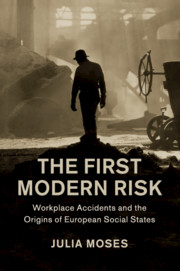Crossref Citations
This Book has been
cited by the following publications. This list is generated based on data provided by Crossref.
Long, Vicky
and
Brown, Victoria
2018.
Conceptualizing work-related mental distress in the British coalfields (c.1900–1950).
Palgrave Communications,
Vol. 4,
Issue. 1,
2019.
Bibliography.
International Review of Social History,
Vol. 64,
Issue. 3,
p.
563.
2019.
Blanc de plomb. Histoire d'un poison légal.
p.
349.
Lobban, Michael
2021.
Imperial Incarceration.
Auerbach, Sascha
2021.
Armed with Sword and Scales.
Shimizu, Hiroto
2021.
Narrative reconstruction of mental illness as a work‐stress‐induced disorder: Processes, consequences and implications.
Sociology of Health & Illness,
Vol. 43,
Issue. 5,
p.
1206.
Amarir, Imane
Mounir, Hamid
and
Marjani, Abdellatif El
2022.
Advanced Intelligent Systems for Sustainable Development (AI2SD’2020).
Vol. 1418,
Issue. ,
p.
896.
Harris, Bernard
2022.
Social security, full employment and voluntary action: The three pillars of William Beveridge's welfare society.
Social Policy & Administration,
Vol. 56,
Issue. 2,
p.
203.
Friedman, Rachel Z.
2022.
Understanding Social Insurance: Risk and Value Pluralism in the Early British Welfare State.
Political Research Quarterly,
Vol. 75,
Issue. 2,
p.
278.
Leese, Peter
2022.
Resilience.
p.
75.
Andersson, Lars-Fredrik
Eriksson, Liselotte
and
Harris, Bernard
2022.
Did statutory insurance improve the welfare of Swedish workers? The statutory workplace accident insurance act of 1916.
Labor History,
Vol. 63,
Issue. 2,
p.
210.
Delcea, Sergiu
2022.
A nation of bureaucrats or a nation of workers? Welfare benefits as nation-building modernization tools in interwar Romania.
Journal of European Social Policy,
Vol. 32,
Issue. 1,
p.
75.
Börner, Stefanie
2022.
Deformation oder Transformation?.
p.
49.
Andersson, Lars Fredrik
Eriksson, Liselotte
and
Nystedt, Paul
2022.
Workplace accidents and workers’ solidarity: mutual health insurance in early twentieth‐century Sweden†.
The Economic History Review,
Vol. 75,
Issue. 1,
p.
203.
Lejeune, Aude
2023.
Fighting for sheltered workshops or for inclusive workplaces? Trade unions pursuing disability rights in Belgium.
Disability & Society,
Vol. 38,
Issue. 2,
p.
228.
2023.
Arbeit und Gesundheit in der Spätmoderne.
Vol. 12,
Issue. ,
SCHEVE, KENNETH
and
SERLIN, THEO
2023.
The German Trade Shock and the Rise of the Neo-Welfare State in Early Twentieth-Century Britain.
American Political Science Review,
Vol. 117,
Issue. 2,
p.
557.
Krippner, Greta R.
2023.
Unmasked: A History of the Individualization of Risk.
Sociological Theory,
Vol. 41,
Issue. 2,
p.
83.
Boudia, Soraya
and
Jas, Nathalie
2024.
Global History of Techniques.
Vol. 9,
Issue. ,
p.
729.
Itzen, Peter
2024.
Ordnung und technologische Disruption in einer Kulturgeschichte des Aufstiegs und Falls der Industriemoderne (1700–2000).
List Forum für Wirtschafts- und Finanzpolitik,
Vol. 50,
Issue. 1-2,
p.
5.



